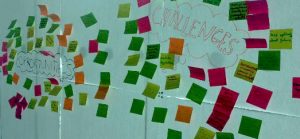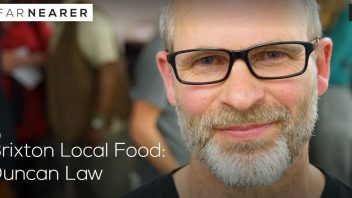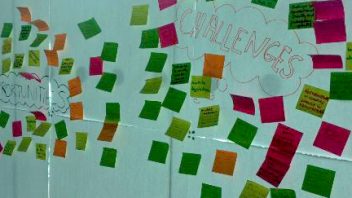Three years ago the REconomy Project set out with the aim of supporting communities to transform their local economies. Like the rest of Transition, REconomy is an experiment – a real live economic laboratory at community level, learning as we go. There have been some great successes, particularly thanks to our local pilots in Brixton and Totnes where their Local Entrepreneur Forums and Open Project Nights have seeded new enterprises, collaborations and relationships. Fifteen events across the UK have see over 500 people from around 50 Transition Initiatives come together to start making real changes in their communities. These events have been hugely enhanced through partnerships with others working in the field – Regather, Blue Patch, Transition London and South East to name a few.
So as the funded element of this phase of Reconomy comes to an end it seemed fit to draw not only on our own experiences, but of other people and organisations in the Reconomy space, to look at what support is needed now to take the movement forward.
The Future of Local Economies Day in Birmingham at the beginning of April brought together a group of 20 people to kick start these conversations. The aim?
- To explore the current context and activities;
- to identify commonalities – potential opportunities and barriers;
- and to explore the scope or need for a coordinated or collective approach to activity across communities or at other levels of scale.
We started the day b y identifying the current challenges and opportunities. And whilst there were certainly regional differences some themes quickly began to emerge. It was heartening to put ‘council cuts’ in with the opportunities – we heard stories of councils being more creative in their approaches and open to new ideas and community led solutions.
y identifying the current challenges and opportunities. And whilst there were certainly regional differences some themes quickly began to emerge. It was heartening to put ‘council cuts’ in with the opportunities – we heard stories of councils being more creative in their approaches and open to new ideas and community led solutions.
A big challenge was connecting what was going on locally across the different sectors – food, housing, health, energy. People were often aware of beacon projects in other parts of the country or other countries but not on their own doorsteps.
So what were the questions that the group decided to discuss through the open space model? We identified six topics where there were opportunities or challenges that we might address together.
1. How do we sustain a local currency?
“There is very little impact study of either the local pound based or time based currency models and we think that’s an opportunity missed so far. Because we really need that impact evaluation for us to be able to decide whether it’s worth us starting up our own currency schemes. It’s something we really need to tack urgently.”
2. How do we move from volunteering to livelihoods?
3. What’s the role for Local Government?
“We think there are some really interesting legislative tools around and other models – the Localism Act and The Well-being of Future Generations Act. National Government doesn’t know how to get this information out; we need to build the knowledge and confidence for people too use it.”
4. How do we create a pipeline for local investment?
5. What we are doing in Sheffield?
“We were able for the first time to genuinely articulate the set of problems that hadn’t really been understood at the city or city region level.”
6. How do we establish solidarity economies across place?
“When you go into a place where people are trying to do all kinds of different things – housing, livelihoods, asset development, food growing – they don’t understand all the organisations that are operating at a national level for them. But it’s in communities where all the really interesting things are happening and where the expertise is being generated. Peer to peer work might be a better way to have those conversations on a local level.”
These are just a snapshot of the discussions; we’ll be presenting the full conversations in a short report coming soon. But one thing is for sure – the possibilities for working together through partnerships, peer to peer networking or through online or social groups are great. And we’d love to widen the conversation. If you would like to contribute please get in touch.






Connect